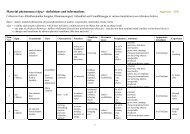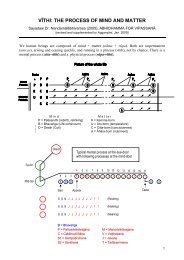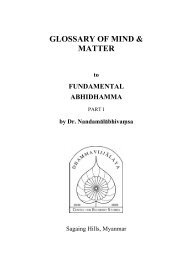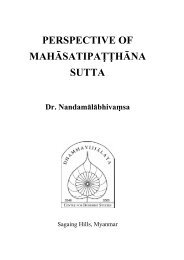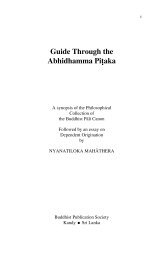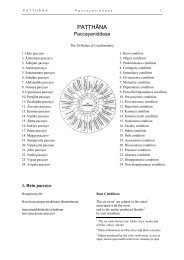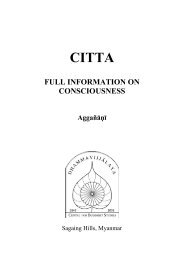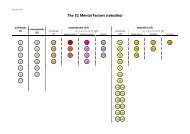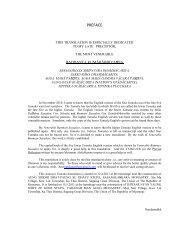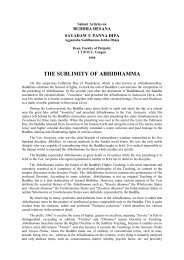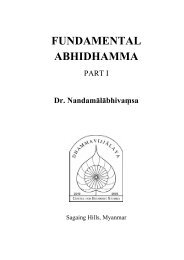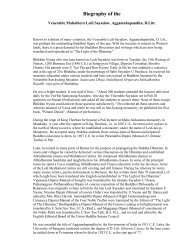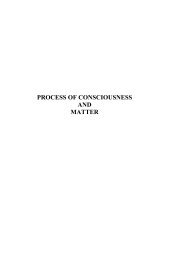ABHIDHAMMA IN DAILY LIFE - Abhidhamma.com
ABHIDHAMMA IN DAILY LIFE - Abhidhamma.com
ABHIDHAMMA IN DAILY LIFE - Abhidhamma.com
You also want an ePaper? Increase the reach of your titles
YUMPU automatically turns print PDFs into web optimized ePapers that Google loves.
Bhikkhu of my thoughts.<br />
11.11.15. Readers should consider these facts seriously and try to <strong>com</strong>prehend the unique<br />
Dhamma as much as one could manage. If you have already accumulated some parami<br />
perfections in many past existences, you should continue your efforts in the line of minimizing<br />
evil deeds and consolidating your parami such as charity (Charity) and morality (Síla). Only then<br />
you will be a virtuous Deva in the Deva world or a virtuous human in the human world. Like<br />
Bodhisattvas who practice parami perfections even in the dark age’s void of sasana, you should<br />
try to fulfill your parami perfections as much as possible to gain habits and maturity in the<br />
performance of wholesome deeds.<br />
11.12 The Pleasure Of Brahmas<br />
Brahmas are very peaceful beings; they enjoy the tranquility of jhana wholesome merits they had<br />
performed previously to gain the Brahma realm. They are reborn as Brahmas only after attaining<br />
jhana; and for this they had to meditate in solitude in quiet places away from the crowded cities,<br />
villages, monasteries, remote from the throngs of society and the worldly sensual pleasures.<br />
Brahmas have no spouses, no children. They have no sexual features so they do not enjoy the<br />
pleasures. They had clearly seen the faults of sensual pleasures even during their meditation<br />
period as human being. Therefore, they live a very pure life, free from all thoughts of sensual<br />
pleasures.<br />
In their divine places and gardens, all Brahmas live in serenity, in saintliness. Some enjoy their<br />
jhana bliss while some develop loving kindness meditation - mettá bhávaná radiating waves of<br />
loving-kindness. Like in the human world there are different grades of Brahmas. There are<br />
Brahma kings, Brahma purohita (advisors or counselors) and lower grade of Brahmas who form<br />
the retinue in attendance to the king. Lower Brahmas cannot see the Brahma king without his<br />
consent.<br />
11.12.1. Asannasatta Brahmas<br />
Asannasatta Brahmas are those divine beings without any consciousness or mind. As human<br />
beings they discover the faults of mind (citta)_and memory (sanna). They see that all forms of<br />
greed arises because of mind, they also see that life would be so peaceful had there been no<br />
mind. While concentrating on the fault of consciousness, "Mind is loathsome.Mind is<br />
loathsome", they develop a kammatthana called disgust for memory - sañña.” sannaviraga<br />
bhávaná “<br />
When they die, they are reborn as Brahmas, in the Asannasatta Brahma realms and live like<br />
golden statues, standing, sitting or reclining without consciousness. Their life span is 500<br />
kappa’s long.<br />
11.12.2. Arupa Brahmas<br />
Arupa Brahmas have no matter - rupa; they have consciousness only. In the human world they<br />
worked for attainment of jhana; after that, they concentrate on the faults of matter ; they see that<br />
Page 110 A Gift of Dhamma Maung Paw, California



